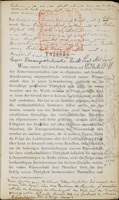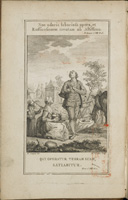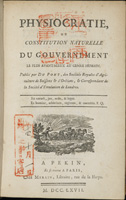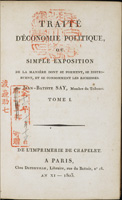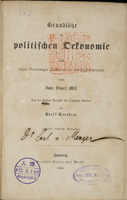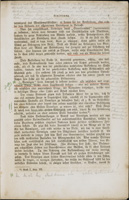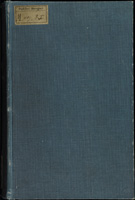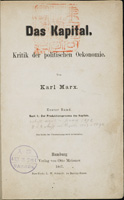The Carl Menger Library
An excellent collection of approximately 20,000 volumes assembled by Carl Menger, one of the founders of the Austrian school of economics. The Carl Menger collection has three principal features: 1) it represents a substantial collection of classics on economics and social thought; 2) it contains a great range of social science books in related fields written in over a dozen European languages; 3) it includes many books with Menger’s own marginal notes, notebooks and correspondence in his own hand, and other documents.
With regard to the first feature, classics on economics and social thought make up sixty percent of the whole collection, and are sorted as Lateinische, Alt-Deutsche, Compendien, Monographien, Englische, Franzosische, and Italienische. The Latin books are sixteenth- and seventeenth-century classics, from Campanella and Erasmus onward. Old German books are mainly the works of German Cameralists. Writers of the Historical school of economics and Menger’s contemporaries, Rau, Conrad and Roscher comprise the Compendien. The Monographien section covers classics on economics in a broad sense, including the writings of Carl himself and of his brothers Anton and Max, as well as a first edition of the first volume of Marx’s Das Kapital (1867). English economics literature is systematically represented in various editions of Adam Smith’s Wealth of Nations (1776) and translations of this work, the first edition of the principal writings of Malthus and Ricardo, and Mercantile and Classical works, as well as works by Jevons, another founder of the marginal school. The French material is also substantial, ranging from Bodin, Necker, and Turgot to Walras and the Socialists.
With regard to the second feature, the collection displays a remarkably wide range of interest, from jurisprudence, history, and sociology to ethnology, travels, statistics and periodicals, a result of the lifelong evolution of Menger’s thinking and his bibliophilism. The collection is thus useful not only to economists but also to researchers in various other disciplines. It also helps provide an all-round view of Menger and his achievement, culminating in the revised edition of his Grundsatze der Volkswirtschaftslehre (published posthumously), a book regarded as opening the way to a paradigm shift to economic anthropology.
With regard to the third feature, various books in the collection contain marginalia by Menger. The specially bound first edition of his Grundsatze is particularly full of marginal notes, providing important clues about how he intended to revise the work. Innumerable marginal notes are also found in a German translation of the Wealth of Nations (1846) and of Mill’s Principles of Political Economy (1864), as well as books from the German Historical school such as Rau’s Grundsatzen der Volkswirthschaftslehre (7th ed., 1863) and Roscher’s Grundlagen der Nationalokonomie (6th ed., 1866), which served at that time as standard textbooks. These are precious materials for research on the formation and development of Menger’s economics.
The collection also contains correspondence from his brother Max and from Conrad, a celebrated economist of the time, notebooks for checking off books, and bills received from antiquarian booksellers. All of these are interesting materials that throw light on his life and the formation of his collection.
Catalog
- Katalog der Carl Menger-Bibliothek in der Handels-Universität Tokio
- Katalog der Carl Menger-Bibliothek in der Hitotsubashi-Universität, 2
Menger’s Principles of Economics
Grundsätze der Volkswirthschaftslehre
(Menger/Mon.:2142)
Digital Library
Digital Library of Carl Menger Collection
Publication details
Grundsätze der Volkswirthschaftslehre / von Carl Menger
Publisher: Wien : Wilhelm Braumüller
Publication Date: 1871
Physical Description: xii, 285, [1] p. ; 23 cm
Notes: No more published
Errata at end
Includes bibliographical references
Interleaved, with manuscript notes by author
Title corrected in pen by author’s hand: Allgemeine theoretische Wirthschaftslehre
On t.p. written in pencil: No. 3
Author: *Menger, Carl, 1840-1921
Language: German
Explanation
The founder of the Austrian School of economics and one of the most eminent figures in modern economic theory, Carl Menger left a specially bound copy of his masterpiece Grundsätze der Volkswirtschaftslehre with extensive marginalia. Menger never agreed to requests and solicitations to revise or translate the Grundsätze. It is thought that this was because he himself planned eventually to produce an extensively revised edition, as he had three special copies of the book made with blank leaves inserted between all the pages; the book here is one of these three. It is noteworthy that a new title is indicated in the author’s own hand: Allgemeine theoretische Wirthschaftslehre (General Theoretical Economics). It is inferred that he proposed as part of his lifework to deal with the question of what economics means for humanity, developing a system of economics as anthropology.
The CHSSL has also another copy with his marginalia. The remaining copy was donated to Duke University, Durham NC, along with other manuscripts. Menger’s son Carl consulted the Duke copy when preparing the second edition of the Grundsatze in 1923 after the death of his father.
Quesnay’s Physiocratie
Physiocratie, ou, Constitution naturelle du gouvernement le plus avantageux au genre humain
(Menger/Fr.:470)
Publication details
Physiocratie, ou, Constitution naturelle du gouvernement le plus avantageux au genre humain / publié par Du Pont …
Publisher: A Pekin, et se trouve a Paris : Chez Merlin, libraire
Publication Date: 1767
Physical Description: 2 v. in 1 ([4], cxx, 520 p., [1] leaf of plates) : ill. ; 20 cm
Other Title OH:Discussions et développemens sur quelques-unes des notions de l’économie politique
Notes: Pt. 2 has special t.p.: Discussions et développemens sur quelques-unes des notions de l’économie politique. Pour servir de seconde partie au recueil intitulé: Physiocratie
Authorship attributed to Francois Quesnay. Cf. Barbier
Place of publication (Pekin) is false
Each part has errata on t.p. verso
Author: *Quesnay, Francois, 1694-1774
Du Pont de Nemours, Pierre Samuel, 1739-1817
Language: French
Explanation
The title of this work by Francois Quesnay, edited by Dupont de Nemeurs, is the origin of the name Physiocracy. Bibliographical confusion arose because the publication date on the title page of the so-called first edition was 1768, whereas that of the second edition was 1767. It was Luigi Einaudi, economist and the first president of the Italian Republic, who solved the problem; he found in the Katalog der Carl Menger-Bibliothek in der Handels-Universitat Tokio first and second editions both published in 1767. He remarked in an essay published in 1958 that, while the place of publication of the so-called first edition read “A Leyde, et se trouve a Paris", that of the Tokyo Commercial University read “A Pekin, et se trouve a Paris." In the editor’s commentary on the Peking edition, one reads: “It was in December 1758, in the presence of the King, at the Palace of Versailles, that the Economic Table was first published," while the expression “in the presence of the King (sous les yeux du roi)" was deleted from the Leiden edition. The Peking edition is very rare, there being only a few copies extant.
Say’s Traité d’économie politique
Traité d’économie politique, ou, Simple exposition …
(Menger/Fr.:1428)
Publication details
Traité d’économie politique, ou, Simple exposition de la manière dont se forment, se distribuent, et se consomment les richesses / par Jean-Batiste Say …
Publisher: A Paris : Chez Deterville
Publication Date: an XI, 1803
Physical Description: 2 v. ; 21 cm
Notes: Includes bibliographical references and index
Author: *Say, Jean Baptiste, 1767-1832
Language: French
Explanation
Jean Baptiste Say, 1767-1832, was a leader among the liberal economists of nineteenth-century France. In this work, he expounds the necessary accord between demand and supply and denies that economic crises are caused by an excess of production. This proposition is known as Say’s law, or the law of the market. Say’s law can be summed up as “Production is not limited by the scale of consumption." Its arguments involve 1) equilibrium between buying and selling, according to which money is only a medium and all products are purchased by other products, and 2) equilibrium between production and consumption caused by the fact that production begets income and income begets demand. J. Mill, Ricardo and J.S. Mill adopted Say’s law, while Malthus, Lauderdale and Sismondi criticized it. Keynes begins his General Theory of Employment, Interest and Money with a critique of Say’s law, treating it as one of the two postulates of the classical theory. This work of Say’s contributes to both micro and macro economics, with its law of the market, utility theory, price theory, entrepreneurial theory and national income theory.
German edition of J.S. Mill’s Principles of Political Economy
Grundsätze der politischen Oekonomie : nebst einigen Anwendungen derselben auf die Gesellschaftswissenschaft
(Menger/Eng.983)
Publication details
Grundsätze der politischen Oekonomie : nebst einigen Anwendungen derselben auf die Gesellschaftswissenschaft / von John Stuart Mill ; aus der fünften Ausgabe des Originals übersetzt von Adolf Soetbeer
Edition: 2. deutsche Ausg
Publisher: Hamburg : Perthes=Besser und Mauke
Publication Date: 1864
Physical Description: xxiv, 734 p. ; 24 cm
Other Title VT:Principles of political economy
Authors: *Mill, John Stuart, 1806-1873
Soetbeer, Adolf, 1814-1892
Language: German
Explanation
This work is a German edition of J.S. Mill’s masterpiece. John Stuart Mill, 1806-73, is well known as an economist of the transition period of English classical economics. His aim in this work was to reconstruct liberal economics through modernized social philosophy. He divides the work into a theoretical part (the 1st to the 4th section) and a political part (the 5th section). It is striking that he distinguishes distribution theory from production theory because, while the latter deals with physical truth, the former should be, according to him, variable historically and socially. It is also important that his dynamic theory deals with the state of suspension, and that the future of the working class is discussed. Mill’s social philosophy expressed in his distribution theory and dynamic theory is a constant undercurrent of the political theory of the 5th section, and would direct his writing life and social reform activities after 1860. The CHSSL copy has marginalia by Menger.
Marx’s Kapital
Der Produktionsprocess des Kapitals
(Menger/Mon.:2039)
Publication details
Der Produktionsprocess des Kapitals
Publisher: Hamburg : O. Meissner
Publisher: New-York : L.W. Schmidt
Publication Date: 1867
Physical Description: xii, 784 p. ; 23 cm
Author: *Marx, Karl, 1818-1883
Language: German
Explanation
This is Karl Marx’s classic work which, using for its subject matter English capitalism of the heyday of free competition, attempts to clarify the principles and contents of capitalist economy. According to him, the two factors of a “commodity" (use-value and value) are the result of the duality of concrete labor and abstract labor of labor-as-commodity. However, the substance of value is “socially necessary labor." In this way he reconstructs the classical labor theory of value. Commodities express their value by the amount of use-value of other commodities of the same value. Therefore value ascends conceptually to the “value-form" by relativity and equivalency. The movement of commodities, detached and “alienated" from human labor, implants in the heart of the commodities producer the “alienated conscience" of the “commodity fetish." When equivalency develops into “money," it becomes the higher illusion of the “money fetish." “Circulation of commodities" mediated by money is an alienated form of “social transformation of substance," which is in fact a transregime transformation of the holders and positions of labor products. It is a world in which the law of value rules with violence. Only 1,000 copies of the first edition of the first volume were published, and Hitotsubashi University has three of them (the CHSSL has two copies and Hitotsubashi University Library one).


